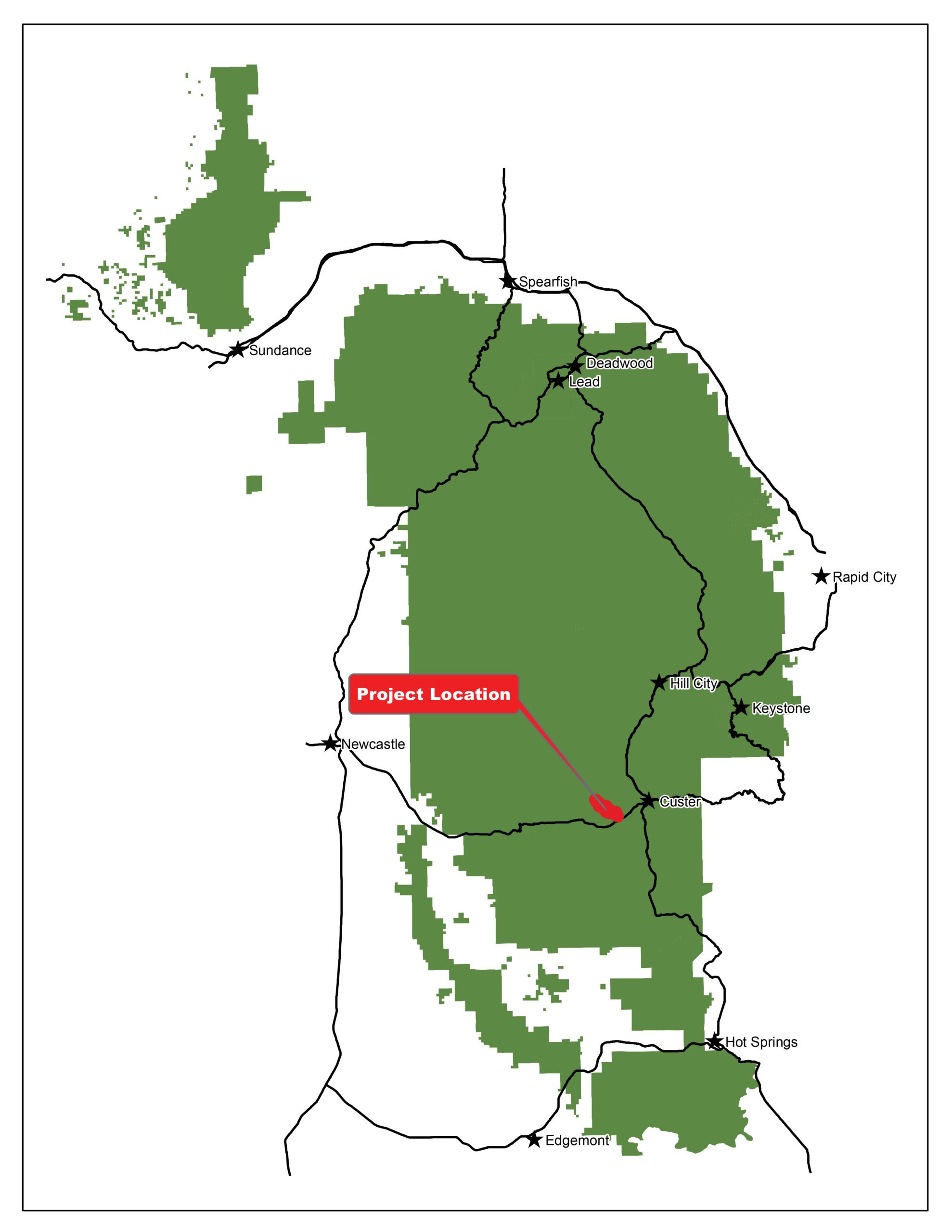Residents unite against approval of exploratory drilling project in the Black Hills

Newark Exploratory Drilling Project vicinity map. Photo from Forest Service Hell Canyon Ranger District.
RAPID CITY – NDN Collective is calling a collaboration between Native and non-Native communities “monumental.” They recently announced the alliance to form a board in opposition to the U.S. Forest Service’s approval for F3 Gold to begin its Newark Exploration Drilling Project. The board will continue to organize and escalate opposition to the project.
The environmental concerns related to F3 Gold’s Newark Exploration Drilling Project in the Black Hills National Forest include potential impacts on water quality, wildlife habitat, and cultural sites.
Taylor Gunhammer, an organizer at NDN Collective and a member of the newly formed community board opposing the project, said the project has united area residents. “Through our shared opposition to F3 Gold’s exploratory drilling project, local Native and non-Native communities realized we have similar ideals about how this land should be cared for – and that the only way for us to protect ourselves from this toxic mining is to band together as a united force.”
It was a packed house again, on Tuesday July 16, as nearly 100 members of the community attended another public meeting in Custer, this time to oppose the U.S. Forest Service’s approval of the project in the Black Hills National Forest. The approval has eliminated both environmental review and meaningful tribal consultation.
Residents have submitted hundreds of comments since last year and have packed the public meetings in overwhelming opposition to the exploration drilling project, demanding that the USFS halt the project.
A large diverse group of people including water protectors, residents and business owners had gathered in February of 2023 where they asked questions about the project. Attorney Mario Gonzalez, who has worked tirelessly on Indian legal issues for decades and is one of the world’s leading experts on Indian Law, was also there to ask questions.
After last week’s meeting, NDN Collective said in a press release that community members of Custer made a direct and intentional ask to have an Indigenous person on the board, noting the leadership of Indigenous people.
F3 Gold says they are a small private gold exploration company, and their proposal was “born from our love of geology and recreation.” F3 has said that they have proposed only an exploratory project, not a mining project. They say exploration activities have very minor to no environmental impacts.
Lilias Jarding of the Black Hills Clean Water Alliance says that any effort to explore will lead to drilling. Other commenters of the project said it’s a reasonable conclusion to assume that if gold is found mining would ensue.
Many also believe that the proposed action will have significant effects on the French Creek watershed, aquifers and domestic wells, recreation and tourism, and wildlife.
Karie Decker from the Rocky Mountain Elk Foundation said that their organization represents 225,000 members nationwide, 4,500 of whom are members in South Dakota. Decker said the Newark Project is adjacent to the Big Game Winter Range areas which are managed to provide high-quality winter and transitional habitat for deer and elk, high-quality turkey habitat, habitat for other species and a variety of multiple uses. Decker said the extended disturbance that is likely to occur could impact elk on winter range and calving areas during the reproductive season.
The Forest Service states that a review plan of operations was completed and that they consulted specialists – wildlife biologists, hydrologists, fire and fuels managers, recreation managers – and none identified any significant impacts.
Susan Scheirbeck is a long time Hill-City resident and a House candidate for District 30. “For decades locals have seen incomplete restoration efforts, leaks and even taxpayers having to pay for cleanup and repairs. We have a Superfund site due to poor oversight. We need much higher bonds to cover the issues that arise decades down the road.” Scheirbeck is referencing the Gilt Edge Mine.
As did Tom Patterson, who in his 3-page comment submission said the Forest Service should review the history of the Gilt Edge Mine, pointing out it was their approval of the mine in the 1980’s “which has been allocated in excess of $87 million” to try and correct the damage caused. Reclamation was not complete, and the company went bankrupt.
During his research, Patterson said he found documentation showing considerable environmental degradation and disasters because of mining activities in the Black Hills but was unable to get a comprehensive summary of that history from the Forest Service. He said every government agency at both the state and federal level has an obligation and responsibility to know and understand the history as well as the mistakes that have been made and how they can be avoided in the future.
Jarding says all drilling should be halted until the mining law is addressed. Scheirbeck agrees, telling Native Sun News Today that the 1872 Mining Law is antiquated and is a century overdue for revision.
Drilling activities can introduce pollutants into the soil and water, affecting local ecosystems. Some common ones include heavy metals, like lead, mercury, and arsenic, hydrocarbons, and chemical additives used in drilling fluids. These substances can contaminate soil, groundwater, and surface water, posing risks to both ecosystems and human health. Proper management and monitoring are crucial to mitigate these impacts.
Additionally, noise and disruption from drilling can disturb wildlife and sacred areas.
Gunhammer said they all recognize the importance of protecting the land and are united in their efforts against toxic mining.
(Contact Marnie Cook at cookm8715@gmail.com)
The post Residents unite against approval of exploratory drilling project in the Black Hills first appeared on Native Sun News Today.
